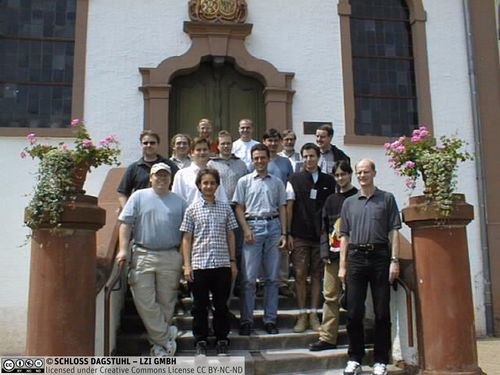Dagstuhl Seminar 01241
Management of Metacomputers
( Jun 10 – Jun 15, 2001 )
Permalink
Organizers
- Francine D. Berman (University of California - San Diego, US)
- Alexander Reinefeld (Konrad-Zuse-Zentrum - Berlin, DE)
- Uwe Schwiegelshohn (TU Dortmund, DE)
Contact
The success of the Internet along with the growing number of high-performance computers worldwide has led to the concept of "metacomputing" or, more recently, the "computational grid". In principle, a metacomputer can be considered as an extension of a distributed computer with a variety of geographically dispersed resources, such as supercomputers, storage systems, data sources and special devices, which are seen by the user as a single unified resource. A typical metacomputer consists of various architectures with different application software. Those architectures usually belong to a variety of owners and are accessed from a large number of independent users.
Ideally, the distributed nature of a metacomputer environment is transparent to the user, that is, he/she only needs to describe the constraints connected with the job while the system selects the most suitable machine for the execution of his job.
This selection process is subject to a large variety of different constraints including access restrictions, user priorities, machine workload, job characteristics and user preferences. In addition the metacomputer structure may change due to maintenance shut downs or temporary failures of sub-systems. It is the task of the management software to handle those problems, that is, to provide a transparent access to the users while considering any special requests from users and owners. Therefore, the management software will be a key component of a metacomputer.
Scope
The architecture and the methods of such a management software will be the key subject of this Dagstuhl seminar. It will emphasize the design, analysis, implementation, and deployment of metacomputer management systems. The topics of interest include, but are not limited to:
- Resource management: This includes tools and mechanisms for specifying, advertising and organizing all types of distributed resources.
- Matching owner and user constraints: Machine owners and users may impose specific constraints that must be considered when scheduling jobs on the machines of a metacomputer. Those constraints can be static or dynamic.
- Machine utilization: Due to the high costs of most high performance computers it will be the goal of a typical metacomputer to minimize the number of idle resources.
- Integrating local management systems: Any high performance computer is equipped with its own management software. The management software of the metacomputer must cooperate with this local software. This may require the use of standardized interfaces.
- Remote data access and caching strategies: This includes strategies for distributing data among the nodes for increasing data access and fault tolerance.
- Accounting: Any commercial metacomputer requires some method of accounting which should be included into the management software.
- Metacomputer applications in science, engineering, and business
- Larry Carter (University of California - San Diego, US)
- Steve Chapin (Syracuse University, US)
- Dick H.J. Epema (TU Delft, NL) [dblp]
- Jeanne Ferrante (University of California - San Diego, US) [dblp]
- Lord Manfred Hess (Universität Heidelberg, DE)
- S. Lennart Johnsson (University of Houston, US)
- Thilo Kielmann (VU University Amsterdam, NL) [dblp]
- Arnaud Legrand (ENS - Lyon, FR) [dblp]
- Thomas Ludwig (Universität Heidelberg, DE) [dblp]
- André Merzky (VU University Amsterdam, NL)
- Barton P. Miller (University of Wisconsin - Madison, US) [dblp]
- Jean-Marc Nicod (University of Franche-Comté - Besancon, FR) [dblp]
- Alexander Reinefeld (Konrad-Zuse-Zentrum - Berlin, DE) [dblp]
- Volker Sander (Jülich Supercomputing Centre, DE)
- Florian Schintke (Konrad-Zuse-Zentrum - Berlin, DE) [dblp]
- Uwe Schwiegelshohn (TU Dortmund, DE) [dblp]
- Achim Streit (Universität Paderborn, DE) [dblp]
- Domenico Talia (University of Calabria, IT) [dblp]
- Jon B. Weissman (University of Minnesota - Minneapolis, US)
- Roland Wismüller (Universität Siegen, DE)
- Ramin Yahyapour (TU Dortmund, DE) [dblp]


